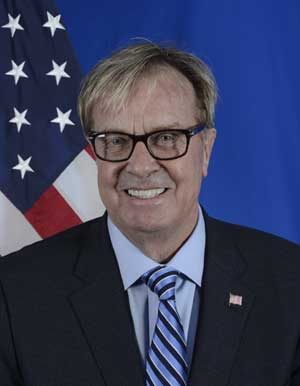The Importance of the Upcoming FAO Election
ROME, Jun 18 2019 (IPS) - With each passing day, the world gets just a little smaller as the internet and cell phones bring our communities together, reveal our shared challenges, and lay bare our failures. As global citizens, we are all concerned about the growing number of hungry people around the world and the threats to food security. The simple fact is that more than 800 million people go hungry every day, and if that number shocks you, know that experts predict the number to grow significantly over the next ten years.

Kip Tom is U.S. Ambassador to the United Nations Agencies for Food and Agriculture in Rome.
That’s one of the reasons the United States has worked closely with other nations for the last 75 years in the Food and Agriculture Organization of the United Nations (FAO). The FAO is where the nations of the world come together to identify tools and practices to improve agricultural production, to facilitate trade, to enhance sustainability, and to extend knowledge in ways that can improve the health and wellbeing of families everywhere.
Like other important international venues, FAO is only as strong as its membership, and only as effective as its leaders. Over its history, FAO has enjoyed periods of leadership excellence, and also endured eras of waste, mismanagement, and disappointment. At this point in history, with the scale of need noted above, the world community needs an FAO that is effective, bold, and nimble. This month, FAO member states will gather in Rome to elect a new Director General, and in so doing will set the trajectory for the organization for the next four critical years.
I won’t exhaust you with a discussion of the details of UN elections, but I will note there are three candidates for the job, from China, France, and Georgia. And while is it not my intent to endorse any of the three, I believe it is vital to point to the attributes we feel are essential to the job.
Any new Director General must be committed to sustaining FAO’s reputation as the world knowledge center on agricultural development. He or she must work with a variety of partners, including governments, non-governmental organizations, academia and the private sector to support science-based innovations, emerging technologies, and the indispensable value of functioning markets.
The new Director General must be a strong administrator, dedicated to transparency, accountability, women’s empowerment, and neutrality between members. And, importantly, the new Director General must represent all member states and not use this position to further the interests of his or her own national government.
At the FAO Council in April, the three candidates provided members with statements outlining their skills and experiences. Those statements can be found on the FAO website. It is my hope and expectation that all member states will take the time to become familiar with these candidates in advance of the June 23 election and will pay particular attention to the issue of independence. That way, each member can exercise an informed vote, protected by the secret-ballot process that provides anonymity for all.
I ask that FAO member states come to this election with a single objective – to select as Director General the candidate most capable of leading this vital institution honestly, independently, transparently, and effectively. The world desperately needs an FAO that reflects those principles.
Kip Tom is U.S. Ambassador to the United Nations Agencies for Food and Agriculture, based in Rome.
- ADVERTISEMENTADVERTISEMENT


IPS Daily Report







